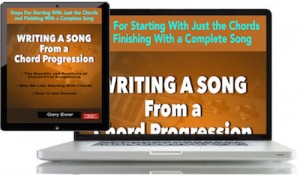How do you make people think something with music? It’s amazing that simply hearing the air vibrate can do that, but such is the strength of being a member of the human race.
I’ve mentioned on this blog before that some songwriters, like Paul Simon, like to compose music (melody and chords) and then decide what the music is about, and maybe some of you do the same thing. But what happens inside the listener’s brain that makes picking up “musical meaning” possible?
Mainly, we’re tapping into the listeners’ cultural background when we hope that they can feel certain emotions from music, even before they hear the lyric. Generally, European and North American listeners will have a somewhat similar take on what kinds of music (i.e. what kind of chord progressions, melodic shapes, instrumentation, etc.) will produce certain emotional responses.
 Are you a chords-first songwriter? Gary’s eBook, “Writing A Song From a Chord Progression” shows you the strengths and possible pitfalls of creating a song by working out the chords first. Here’s how to get chords-first songwriting really working for you. READ MORE..
Are you a chords-first songwriter? Gary’s eBook, “Writing A Song From a Chord Progression” shows you the strengths and possible pitfalls of creating a song by working out the chords first. Here’s how to get chords-first songwriting really working for you. READ MORE..
Basic emotions are the easiest to portray. We can identify melancholy, introspective thought when we hear the opening of “Stairway to Heaven“; happiness when we hear the start of “Walking on Sunshine” (Katrina and the Waves); worry and concern when we listen to Peter Gabriel’s “Don’t Give Up“.
In a sense, we’re talking about musical manipulation at it’s very best. You can direct and control listeners’ moods before they even hear the first words of your song. So let’s think about ways you can create musical meaning:
- Use dynamics. Dynamic contrast – making music louder or softer – has the ability to create musical tension, or release it. It’s a very effective way to enhance musical meaning.
- Move melodies/bass lines upward. Upward-moving melodies tend to intensify emotional value. Upward-moving bass lines tend to enhance the sense of power, positive feelings and hopefulness.
- Move melodies/bass lines downward. Downward-moving lines can diminish musical energy as well as make music sound more introspective or thoughtful.
- Choose major or minor chords. How you use chord quality (i.e., major/minor) can affect the mood of the audience. Changing from minor to major within a song injects hopefulness or positive vibes; major to minor can give music a turn toward a more pensive or even sad mood.
- Use instrumentation. As you rehearse a newly-completed song, look for inventive ways to use instrumentation to get people feeling the way you want them to feel. As an example, think of how The Beatles choice of using string quartet in “Yesterday” added the perfect touch of melancholy.
If you haven’t tried this before, try writing the music before you even decide what your topic might be. You might be surprised that hearing what you’ve composed first will get you thinking in new and innovative directions.
 Written by Gary Ewer.
Written by Gary Ewer.
 Get the Deluxe Bundle deal on Gary’s songwriting ebooks. “The Essential Secrets of Songwriting” bundle packages will take your songwriting to new levels of songwriting excellence. READ MORE
Get the Deluxe Bundle deal on Gary’s songwriting ebooks. “The Essential Secrets of Songwriting” bundle packages will take your songwriting to new levels of songwriting excellence. READ MORE











That’s a radically different approach than “title first” that many others suggest. Typically, I start with a lyrical phrase and then expand it to see if i have a verse or chorus and more often then not the initial spark of the song has a melodic idea attached to it. I do not think that I have ever written a complete melody and then listened for the words it suggested. I do believe I will try that method, thanks to your suggestion.
I remember back when I was a composition student, a fellow student told me of a friend of his wrote an instrumental that she called “Green Music.” When the piece was performed, everyone said to her how uncanny it was that they could “really picture” the colour green. She eventually told them that the title came randomly to her; there was nothing about the piece that was green – she just couldn’t think of a good title. I guess that was a case of a title making people think something, and then people adding the suggested meaning to the music they heard.
-Gary